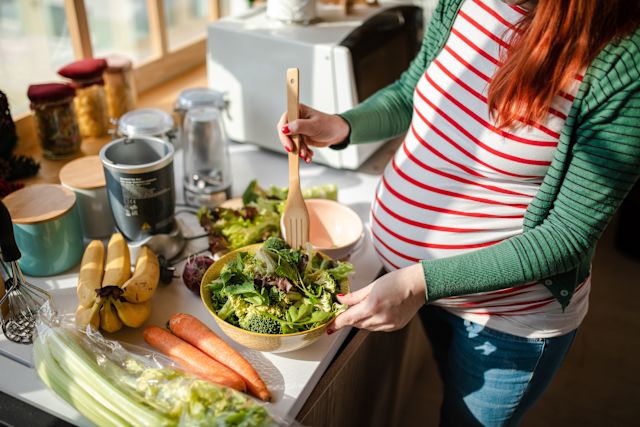Updated on January 26, 2026.
For many people, pregnancy provides an opportunity to review and overhaul various aspects of life. It can be a particularly good time to look at your eating habits and make some healthy changes. You might, for example, think about swapping out some of your go-to meats and dairy products for plant-based options.
Actors Alicia Silverstone and Natalie Portman, for example, are vocal vegans who maintained their plant-based diets while pregnant. Silverstone is so passionate about the topic that she wrote a book titled The Kind Diet: A Simple Guide to Feeling Great, Losing Weight, and Saving the Planet. The book includes a forward written by Neal Barnard, MD, president of the Physicians Committee for Responsible Medicine (PCRM), a professional organization that supports a vegan lifestyle.
Of course, many aspects of following a specialized diet may be a little easier when you’re a celebrity (think personal shoppers and private chefs). But you may still be curious about whether eating a raw food, vegan, or vegetarian diet is healthy. Here’s what you need to know.
The basics of pregnancy nutrition
Pregnant people need a wide variety of nutrients. Some are simply beneficial for a healthy pregnancy. Others, such as folic acid (a B vitamin), are crucial to reducing the risk of birth defects like cleft palate or defects of the brain and spinal cord.
There is no single way to eat to ensure a healthy pregnancy, but options abound. Here are a few varieties of vegetarian and vegan diets:
- Lacto-ovo-vegetarian: Excludes meat but includes dairy products (lacto), eggs (ovo), and honey, together with a wide variety of plant-based foods.
- Lacto-vegetarian: Excludes eggs but can include everything else in the vegetarian diet, including dairy.
- Pescatarian: Excludes meat but includes fish.
- Vegan: Includes a wide variety of veggies and fruits, nuts, and seeds and excludes meat, dairy, eggs, and honey.
- Raw vegan: Includes uncooked, unprocessed, and mostly organic fruits and veggies.
It’s important to eat a wide variety of foods. Getting too much of any one nutrient—such as excessive potassium, vitamin A, or other vitamins and minerals—can lead to health issues, like liver damage in the case of excess vitamin A.
People who are pregnant and following vegetarian or vegan diets should make sure that they’re getting adequate essential amino acids, iron, trace minerals, vitamins B12 and D, calcium, and healthy fats.
A traditional Western diet, high in meat and fat, typically provides more protein than you actually need. Adopting a plant-based diet, even with little animal protein, can still give you plenty of protein and amino acids, according to a 2019 study published in the journal Nutrients.
Still not sure what the best plan is? Meeting with a nutritionist can help you make a plan that benefits you and your growing fetus, while ensuring you’re getting enough (and not too many) calories to support you both.
And that old notion of “eating for two”? It’s outdated. You only need about 340 extra calories per day starting around the second trimester, according to the American College of Obstetricians and Gynecologists (ACOG).
What you leave out is important
There are some good takeaways from raw food, vegan, or vegetarian diets. These including limiting trans and saturated fats and preservatives and adding a good helping of vitamins. But these general parameters can also be followed with other healthy diets that emphasize fruits, veggies, whole grains, and healthy fats while also including animal protein.
Consider the following:
Raw is not the only way to go
Some vegetables release more nutrients when they’re cooked. These include:
- Asparagus
- Broccoli
- Carrots
- Cauliflower
- Mushrooms
- Spinach
- Tomatoes
Remember that how you cook your veggies makes a difference. Roasting in the oven or air fryer, sauteing in a pan, or steaming offer simple, low-fat ways to bring out flavor. Just try not to bathe your produce in excess butter or oil.
Juicing may mean missing out on nutrients
There’s nothing inherently wrong with mixing up a juice of your favorite fruits and veggies. But the juicing process often means losing fiber, an important nutrient that benefits your digestive system and your overall health in many ways. The pain from constipation when pregnant can have you doubled over, so it might be best to keep your system moving along by eating apple slices with the skin on, for example, rather than removing the fiber-rich skin for a juice.
Limit or avoid unhealthy fats
Your fetus eats what you eat, so pregnancy is a good time to cut out back on saturated fats found in foods like butter, bacon, and cheese. Trans fats—which have generally been removed from food products in the United States, but still crop up here and there—are damaging to both you and fetus.
Get the protein you need
A fetus needs approximately 2.2 pounds of protein during your pregnancy, meaning you need to eat at least 1.1 grams (g) of protein per kilogram (kg) of bodyweight per day. (This guideline is more than the recommendation of 0.8 g/kg/day for people who are not pregnant).
Sources of plant-based proteins include nuts and nut butters, seeds, beans, chickpeas, lentils, and wheat. More and more plant-based meat alternatives continue to come to the market.
Pump up with adequate iron
Did you know that the amount of blood your heart pumps increases by up to 50 percent during pregnancy? All the more reason why iron supplementation may be so important if you’ve eliminated red meat.
Speak with a healthcare provider (HCP) about whether taking a supplement for iron or other vitamins and minerals may make sense for you. Note: If iron supplements are causing you constipation, your HCP may advise switching to intermittent (one to three times per week) supplementation instead of daily.
Calcium is key, too
You need calcium from your diet to keep your bones strong. If you’re not getting adequate calcium, your body will take it out of your bones to provide for the fetus. Do yourself a favor and check with an HCP to make sure you’re getting adequate calcium in your diet or vitamins.
Everything in moderation
Above all, remember not to overdo it. Too much of any one food is not a good thing, be it bananas, broccoli, or bologna. Avoid supplements with higher than the daily recommended dose for iron, selenium, vitamin A, and vitamin D. (For vitamin A, don’t go higher than 5,000 IU or 1,500 micrograms (mcg) per day. For vitamin D, stay at 4,000 IU or 100 mcg or less). Most prenatal vitamins have a balance of the daily recommended amounts of vitamins for pregnant and breastfeeding people.
Whether you swap red meat for plant-based proteins or have a more flexible approach, you’ll probably find that eating across the rainbow of fruits and veggies during pregnancy will help you feel your best.







